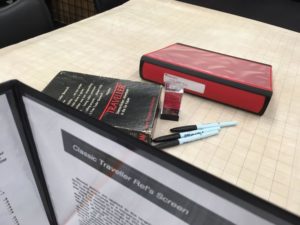Wow, eight games! For some reason if feels like a milestone. It’s hard enough to make the time to game and to get the guys all together, but it is worth the effort. The Sunday afternoon game time seems to still be a good time to play. I would love to play more than once a month, but it’s rough. Weeknights are not good for most of us, and weekend time is at a premium.

This last session involved a lot of bookkeeping for the PCs, trying to decide how to split the loot and/or reward for the stuff they obtained in the last session. Lots of deliberation. I was worried they would be bored with it, but of course it was their decision to spend that time, so I just let it go for quite a while. They were in Jump Space, so they needed something to do.
Anyway, they are now at the beginning of a new series of sessions, and as usual their activity has given me lots of ideas for things to do in the next few games.
I was reflecting on the nature of Classic Traveller yesterday, as I often do, and was thinking about the benefits of a game that doesn’t really have experience levels or experience points. When I played this game nearly 40 years ago the lack of a substantial progression system seemed like such a bummer. Now I think it’s great. Really keeping track of the passage of time in the game allows the PCs to take advantage of the very long method of improving their skills, but doesn’t make it the focus of the game. It also means that you don’t have to begin a campaign by slowing getting the PCs “up” to a level where you can have the “real fun.” They don’t start out super-powered, but they aren’t weak either. This is always an issue with D&D. 1st-level characters are so easy to kill, and since the game is so combat-centric I think it’s a real problem.
So as the GM, I find it very liberating to not really need to consider the experience level of the PCs when designing or running a game. They are skilled humans. If they get shot with a plasma rifle they will probably die. After four years of play, they will probably still die if hit by a plasma rifle. It frees me up to do what I want with the game, and not focus on levels or experience points. It also allows us to take our time with the campaign. We’re not rushing through this. We play for about three hours, and when I think we’re at a stopping point, we stop. I go home and think up the next few encounters, problems, and challenges. It all just makes the game a lot better.
 All of this, however, also forces me attempt a lot more creativity in the campaign. I swear, for each session I spend a week coming up with ideas, making notes, writing up the session only to start over, then on Sunday morning before the game I get up, sit at my desk in state of panic because I don’t like what I’ve got so far, and then it all comes together. I assemble the pieces I’ve got, come up with contingencies plans, think up some NPCs that might be memorable, and the game seems to be enjoyable to the players and to me.
All of this, however, also forces me attempt a lot more creativity in the campaign. I swear, for each session I spend a week coming up with ideas, making notes, writing up the session only to start over, then on Sunday morning before the game I get up, sit at my desk in state of panic because I don’t like what I’ve got so far, and then it all comes together. I assemble the pieces I’ve got, come up with contingencies plans, think up some NPCs that might be memorable, and the game seems to be enjoyable to the players and to me.
I do think that in the future I want to give the players a little less accounting stuff to do. That tends to bog things down a bit. Once in a while it is alright, like last weekend, but certainly not every game, or even every four games. All four players need something to keep them engaged at all times, and I feel like this last game I dropped the ball on that a bit.
Oh, here’s something I found on one of the internet groups for gaming — an article about Lester Dent’s formula for writing an adventure novel. Dent is the author of the well over 100 Doc Savage novels. As an early teen I read about 70 of these books. They are formulaic but entertaining. I had read that Dent had a formula for writing these, but this is the first time I’ve seen it. I think there is some good advice for writing RPG sessions here. Granted, it won’t all work because the players will nearly always do something that you don’t expect, but I think the overall direction of this formula (as well as some of his other advice) might allow a GM to create a nice “filter” to run sessions through. A list of elements to make sure you include. I have made an effort since returning to gaming a few years ago to be a lot more descriptive of location and atmosphere in my cyberpunk and science fiction campaigns. I think I’m going to go through the Dent Formula and make a list of elements I want to be sure to include in every scene I write. It’s just too easy to get going and forget these things.
On a different topic! While preparing for our game Sunday at Madness Games & Comics, among all the Magic the Gathering and D&D players I noticed two guys setting up to play the Fantasy Trip, using the massive and super cool new boxed set from Steve Jackson Games. I was so happy to see someone playing this! I went over and met the two guys who were there, Bruce and Scott. Really nice guys. Bruce told me he’d played a lot of GURPS in years past, and we spent a bit of time talking about such things. He said he recognized my name from online stuff, which tells me what I already knew – I spend way too much time online – but it is nice to make a face-to-face connection!
So, we all connected on MeWe.com, where a lot of the old Google+ groups have migrated. Bruce is sharing writeups of his gaming session, and they are brilliantly written.
